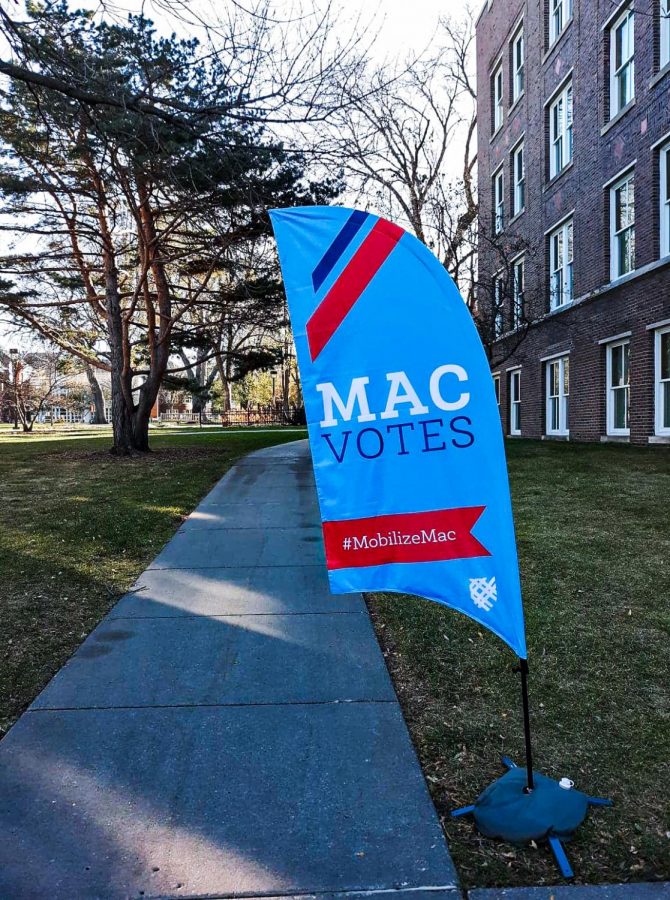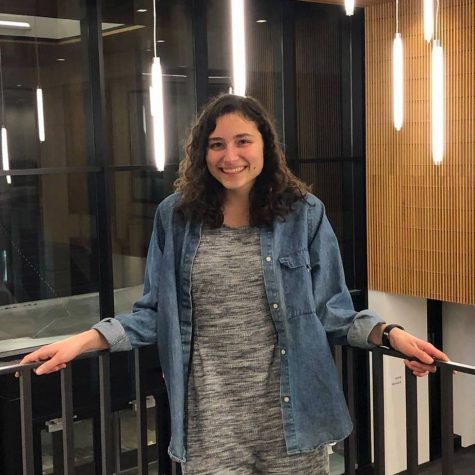Macalester’s safety plan marks tense election cycle
November 3, 2020
On Wednesday, Oct. 28, Vice President of Administration and Finance David Wheaton shared Macalester’s campus safety plan for the week of the election. The plan outlines Macalester’s preparation for general threats to safety, assuming the possibility of unrest, protests or violence in the wake of the Nov. 3 election.
Wheaton wrote that in the event of “an evolving situation,” the college may take actions like increasing the number of Public Safety officers on duty or issuing a shelter-in-place order for students living in the dorms.
“While we honor the rights of individuals to participate in peaceful protests, we are mindful that sometimes demonstrations can turn quickly in more dangerous directions including the possibility of threats to the individual safety of members of our community,” Wheaton wrote in the announcement.
The Incident Management Team (IMT), led by Assistant Vice President of Facilities Services Nathan Lief, has been finalizing these plans for several weeks now in anticipation of the election. The IMT is a standing group made up of administrators and staff members responsible for preparing Macalester’s responses to sudden, short-term hazards or incidents.
Lief sent separate follow-up emails outlining more specific instructions to students living on campus and nearby in St. Paul. Lief advised off-campus students to keep an overnight bag packed in case of a need to leave quickly, stock up several days’ worth of food and water, keep car gas tanks half full and plan out emergency contacts.
In anticipation of a possible shelter-in-place order, Lief instructed students living in college-owned houses and specialty housing to prepare to move into empty dorms. In case of an emergency, Lief wrote, this consolidation would make it easier for Public Safety to “provide adequate protection” to all on-campus students.
Implementing a safety plan for election day is a first at Macalester. Lief, who led the IMT in creating the plan, said it felt like a necessary precaution this year.
“The state of the country right now is so polarized… I and others are concerned that there could be social unrest no matter who wins this next election,” Lief said.
The plan marks the tension of this year’s election. Some journalists and analysts have sounded alarms at President Donald Trump’s false claims of widespread voter fraud, his noncommittal answers to questions about a peaceful transition of power and his campaign’s attempts to limit and complicate voting — including in Minnesota.
Signs of unease are rippling across the country this week. Businesses in major cities are boarding up windows in anticipation of protests — including on Grand Ave. and around the rest of the Twin Cities.
The St. Paul Police Department also increased the number of officers on patrol for the week of the election.
Lief said that some of the IMT’s concern over possible unrest also stems from the protests in May and June after the murder of George Floyd, when Governor Tim Walz activated the National Guard in response to property damage associated with the protests.
The protests over the summer began suddenly and escalated quickly. At the time, the IMT drafted a last-minute emergency plan, bringing more Public Safety officers to campus and preparing to evacuate on-campus students to the suburbs if campus officials deemed it necessary.
The evacuation plan was never implemented. Protesters — and individuals not associated with protests — set fires and broke down storefronts mainly along Lake St. in Minneapolis and University Ave. in St. Paul. Those monitoring the situation at Macalester did not see any serious threats close enough to campus to merit evacuation
But the experience of having unrest erupt without having a plan in place is not one that Lief wants to repeat.
“The last thing we want to have happen is… to not have learned the lessons that we should have learned from that situation,” Lief said. “That’s also feeding into this.”
While planning for election day safety is unique to this year, it’s not unique to Macalester — the IMT is in touch with other colleges that are drafting safety plans for election day. Lief said that Macalester’s insurance company, United Educators, has also shared a pamphlet with campuses outlining safety steps to take ahead of Nov. 3.
While Lief said that the plan is not meant to cause any panic, he hopes that students take the IMT’s tips for preparation seriously.
“I don’t think anybody should be living in a state of anxiety or dread that something’s going to happen tomorrow night, but it’s really important that people think about this ahead of time,” Lief said. “We’ve already seen what has happened in the Twin Cities and in other metro areas around the country, and so doing a little bit of pre-planning and preparation goes a long way.”
One aspect of the plan that students have questioned is the advice to call 911 — all emails instructed students to call the police if they are in danger, and the email to off-campus students added that people should call 911 to “report violence, looting, or other law breaking.”
Over the past several months of ongoing Black Lives Matter protests against police brutality, attitudes towards police have chilled. A number of Macalester students have been active and vocal in the movement to divest from and abolish the police.
Lief said that the IMT discussed this reality, but ultimately decided that omitting 911 from the safety plan would be “irresponsible.”
“I’m sensitive to the feelings out there… but the reality is that they are the ones who are charged with responding to these kinds of incidents,” Lief said. “I would ask, what is the alternative? If you’re a student living off campus and you feel like you’re threatened, that’s the option.”
In response to this advice, Adar Kamholtz-Roberts ’21 posted a thread of police alternatives on Twitter. Macalester students shared the resources widely on social media.
Lief said the IMT did not believe calling 911 would pose a risk to the students making the call.
“Generally it’s not the person calling 911 requesting help that has run into issues in these situations, so I don’t feel like we’re giving people advice where we’re putting them in imminent harm,” Lief said.
Lief emphasized that the plan is meant to be a precaution, not an indicator of what the IMT believes will happen.
“It’s just truly about being prepared for the worst, and likely it will be an effort that is not needed, but if you don’t do it ahead of time and you don’t ask people to prepare, it’s too late when things break the wrong way.”













